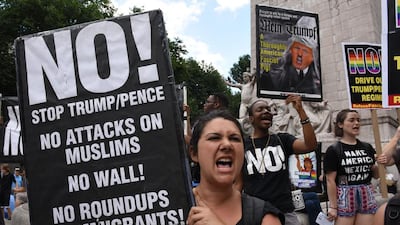Depending on who you ask, the most recent round of legal arguments against Donald Trump’s travel ban has either been a success for the administration or a failure. As always with questions of law, it hasn’t really been either.
This week, after several attempts by Mr Trump and legal challenges, the United States Supreme Court finally approved a partial ban on citizens from six Muslim-majority countries entering the United States for 90 days, pending a final agreement on the technicalities of the order in autumn. That means that parts of the revised order will go ahead and be implemented, before the court considers the full case later this year.
To understand what has changed, what it means and who will be affected, it is important to start with the original order, issued by Mr Trump days after taking office. That order barred people from seven Muslim-majority countries from entering the US for 90 days. It also stopped refugees from those countries who had been accepted.
There was, naturally, enormous uncertainty about who was affected, resulting in heart-breaking stories of people denied entry at ports around the US, or before they boarded in other countries. The new order removes some uncertainty – the order will not affect anyone with a valid visa or green card, nor dual nationals, as long as they are not traveling on a passport from one the countries affected.
Those countries are Libya, Sudan, Syria, Yemen, Somalia and Iran – Iraq has been removed from the list.
But a new caveat has been introduced, that of a “bona fide” connection. The court has explained that those who have a close family relationship, or a relationship with an institution (university, company etc), or have a job offer or university place, would all be exempted from the ban.
That means that those with tourist visas may not be allowed in, or will at least be scrutinised, and that refugees who don’t have a relationship with the country – such as a family member, for example – could be rejected.
That exemption means that thousands fewer will be affected by the executive order, but that parts of it will stand, allowing both sides to claim victory.
Expect chaotic scenes still though. There will almost certainly be court cases to decide what constitutes a “bona fide” relationship. The details of the new order has to be disseminated to thousands of border officials and to airport officials across the world. There will be many times when people are denied entry despite having the legal right to enter – some of these stories will be painful, and will enter the press.
And it may yet be struck down. The Supreme Court will hear arguments on the legality of the new order starting in October. Which means that nationals of those countries, as well as lawyers for groups concerned by the ban, will face a long, hot summer of disrupted travel, broken family meetings and suspended studies. The cost to the idea of America as an open country will be incalculable.

